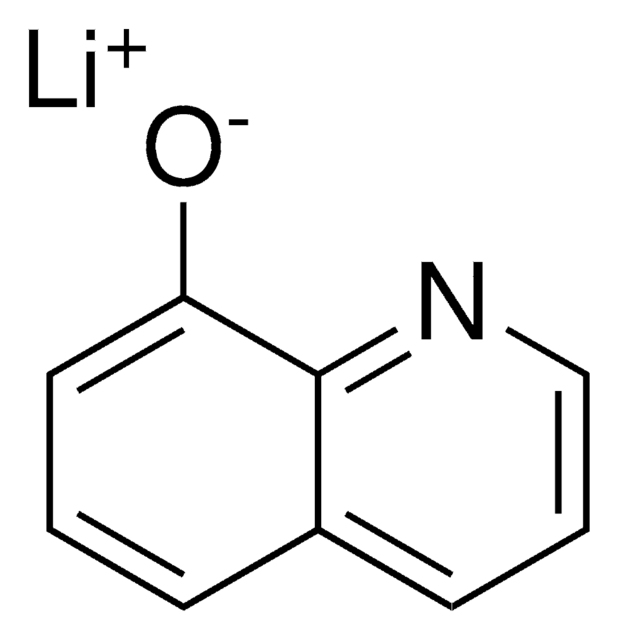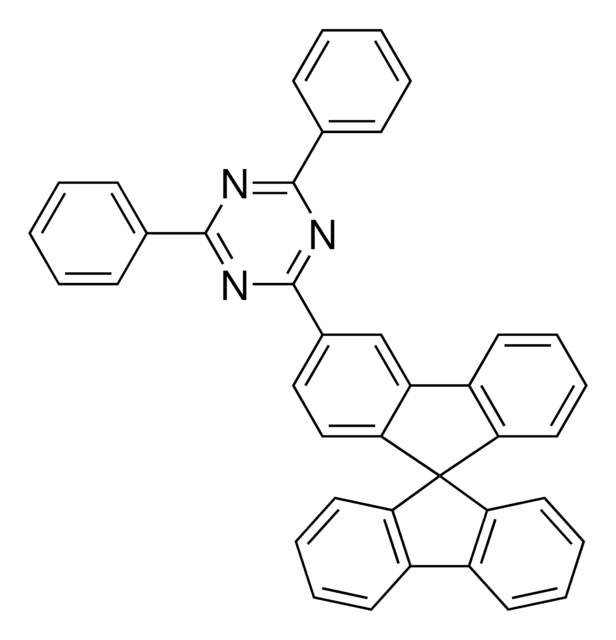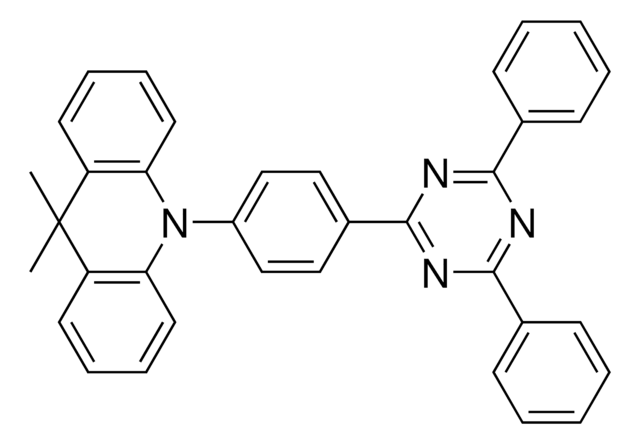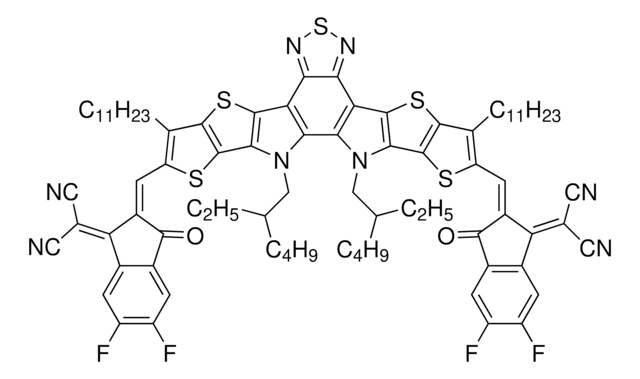推荐产品
描述
PL: 413 nm (in DCM)
品質等級
化驗
≥97%
形狀
powder
顏色
white to yellow
軌道能量
HOMO 5.3 eV
LUMO 3.2 eV
&lambda ;
in dichloromethane
紫外吸收
λ: 353 nm Amax
InChI
1S/C51H38N2/c1-51(2)47-19-11-9-17-43(47)44-31-30-42(34-48(44)51)52(40-26-21-36(22-27-40)35-13-5-3-6-14-35)41-28-23-37(24-29-41)38-25-32-50-46(33-38)45-18-10-12-20-49(45)53(50)39-15-7-4-8-16-39/h3-34H,1-2H3
InChI 密鑰
GJWBRYKOJMOBHH-UHFFFAOYSA-N
應用
N-([1,1′-biphenyl]-4-yl)-9,9-dimethyl-N-(4-(9-phenyl-9H-carbazol-3-yl)phenyl)-9H-fluoren-2-amine (BCFN) is an electron-rich material, with the HOMO energy level of 5.3 eV, the LUMO energy level of 2.2 eV and high hole mobility of 5.43 × 10-5 cm2V-1s-1. As a result, it is used as a hole-transport and hole-injection material in organic light-emitting diodes. BCFN has shown its advantages in improving the hole mobility of polymer-based hole transport layer; lower driving voltage of device, better efficiency, and higher EQE due to exciplex formation by utilizing in EML; and better device lifetimes in the combination of Ir(piq)2(acac) to act as an electron scavenger layer for an reported device.
BCFN is a good morphologically stable material with Tg of 125 °C and Td of 375 °C.
With a ET of 2.58 eV, BCFN is also a very good charge transporting layer material due to its large band gap (Eg = 3.1 eV) 2 for green, red and white phosphorescent organic light-emitting diodes (PhOLEDs).
OLED Device Performance:
BCFN increase the hole transport mobility of PVK (pure PVK: 2.09×10-9 V cm-1 S-1; 30% of BCFN in PVK: 9.86×10-7 V cm-1 S-1; 50% of BCFN in PVK: 1.15×10-5 V cm-1 S-1):
1. ITO/PEDOT:PSS (40 nm)/PVK:BCFN (3:7, 20 nm)/BCFN:PFO (x:1-x, 80 nm)/CsF (1.5 nm)/Al (120 nm)
Color: Blue
BCFN in combination of ET1 to act as EML in forming exciplex and improve device performance:
2. ITO/HIL/HTL/(ET1+P1) or (ET1+BCFN+P1(doped)/ETL/ LiF/Al
Color: red
Device emission area of 81cm2, and at 1000 cd m-2, the efficiency exceeds 200 lm/W and the EQE exceeds 50 %.
lifespan@95: from 71h to 133h
BCFN in combination with Ir(piq)2(acac) as electron scavenger layer:
3. ITO/NDP series in BCFN (3wt.%, 10nm)/BCFN(160nm) or BCFN(130nm)+BCFN:Ir(piq)2(acac)(2wt.%, 10nm)+BCFN(20)/ [Ir(TMSBppy)ppy2]:BPTZBC (10 wt.%, 40nm))/ TPBi:Liq (1:1 wt. % ratio, 36nm)/ Liq (0.1nm)/Al (60 nm)
Color: yellow
Efficiencies are not affected.
lifespan@95: from 71h to 133h
BCFN is a good morphologically stable material with Tg of 125 °C and Td of 375 °C.
With a ET of 2.58 eV, BCFN is also a very good charge transporting layer material due to its large band gap (Eg = 3.1 eV) 2 for green, red and white phosphorescent organic light-emitting diodes (PhOLEDs).
OLED Device Performance:
BCFN increase the hole transport mobility of PVK (pure PVK: 2.09×10-9 V cm-1 S-1; 30% of BCFN in PVK: 9.86×10-7 V cm-1 S-1; 50% of BCFN in PVK: 1.15×10-5 V cm-1 S-1):
1. ITO/PEDOT:PSS (40 nm)/PVK:BCFN (3:7, 20 nm)/BCFN:PFO (x:1-x, 80 nm)/CsF (1.5 nm)/Al (120 nm)
Color: Blue
BCFN in combination of ET1 to act as EML in forming exciplex and improve device performance:
2. ITO/HIL/HTL/(ET1+P1) or (ET1+BCFN+P1(doped)/ETL/ LiF/Al
Color: red
Device emission area of 81cm2, and at 1000 cd m-2, the efficiency exceeds 200 lm/W and the EQE exceeds 50 %.
lifespan@95: from 71h to 133h
BCFN in combination with Ir(piq)2(acac) as electron scavenger layer:
3. ITO/NDP series in BCFN (3wt.%, 10nm)/BCFN(160nm) or BCFN(130nm)+BCFN:Ir(piq)2(acac)(2wt.%, 10nm)+BCFN(20)/ [Ir(TMSBppy)ppy2]:BPTZBC (10 wt.%, 40nm))/ TPBi:Liq (1:1 wt. % ratio, 36nm)/ Liq (0.1nm)/Al (60 nm)
Color: yellow
Efficiencies are not affected.
lifespan@95: from 71h to 133h
N-([1,1′-Biphenyl]-4-yl)-9,9-dimethyl-N-(4-(9-phenyl-9H-carbazol-3-yl)phenyl)-9H-fluoren-2-amine can be used in different application areas as an emissive layer or hole transport layer due the presence of π-conjugated structure and electron-donating/accepting groups. It is suitable to be used in R&D studies such as organic field-effect transistors (OFETs), molecular electronics, sensors, organic photovoltaics (OPVs), and organic light-emitting diodes (OLEDs).
儲存類別代碼
11 - Combustible Solids
水污染物質分類(WGK)
WGK 3
Highly efficient single-unit white OLED device with emission from both singlet and triplet excitons
Ishisone,T., et al.
Society for Information Display International Symposium Digest of Technical Papers, 22, 404-411 (2015)
Improved efficiency of blue polymer light-emitting diodes using a hole transport material.
Liang, J, et al.
Journal of Material Chemistry C, 5, 5096-5101 (2017)
Boron-based TADF emitters with improved OLED device efficiency roll-off and long lifetime.
Bell B M, et al.
Dyes and Pigments, 141, 83-92 (2017)
Achieving highly efficient blue light-emitting polymers by incorporating a styrylarylene amine unit.
Peng F, et al.
Journal of Material Chemistry C, 6, 12355-12363 (2018)
Highly efficient blue polyfluorenes using blending materials as hole transport layer.
Liang J, et al
Organic Electronics, 51, 111-118 (2017)
我们的科学家团队拥有各种研究领域经验,包括生命科学、材料科学、化学合成、色谱、分析及许多其他领域.
联系技术服务部门
![4,4′-环己烯[N,N-双(4-甲基苯基)苯胺] ≥97% (HPLC)](/deepweb/assets/sigmaaldrich/product/structures/111/787/16bde1ce-c76d-46d6-9e1f-9ce09f82d038/640/16bde1ce-c76d-46d6-9e1f-9ce09f82d038.png)
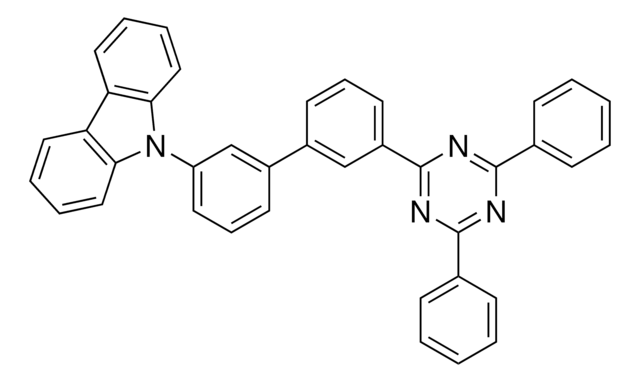
![Tris[2-(p-tolyl)pyridine]iridium(III) ≥99% (HPLC)](/deepweb/assets/sigmaaldrich/product/structures/207/957/bb807380-3690-46c2-809e-e6bc2ba29fa5/640/bb807380-3690-46c2-809e-e6bc2ba29fa5.png)

